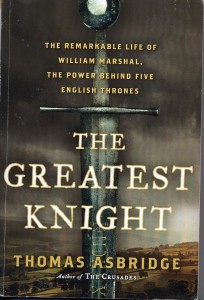Book Review: The Greatest Knight by Thomas Asbridge
Disclaimer: I received this book as a Goodreads giveaway on the premise that I would review it. My copy was an uncorrected proof, and there will be changes to the final edition. Specifically, there will be maps, genealogical charts, and an index.
William Marshal started life as the younger son of a minor noble, so little regarded that when he was taken hostage, his father pretty much said, “go ahead, I can make more.” But a combination of superior battle prowess, a gift for political maneuvering, and a certain amount of luck caused William to rise through the ranks of knighthood, until he ended his career as regent of all England, acting for the boy king Henry III. In some ways, he came to define what people expected a knight to be.
We know more about William Marshal than many other figures of the Twelfth and Thirteenth Centuries because his family commissioned a flattering biography of him, the sole remaining copy of which turned up in the 1860s, and was finally read and translated in the 1880s. Now, I say “flattering”, but as the author points out, what people in the 1220s considered admirable traits do not necessarily conform with what Twenty-First Century folks consider to be the ideal of chivalry. William often acted out of naked self-interest to gain rewards of land and titles. It’s also pointed out when The History of William Marshal skips over or obfuscates events we know from other sources that William was involved with, but don’t reflect well on him.
William Marshal’s life was strongly tied to the fortunes of the Angevin dynasty, and this book covers the political situation of the time, as well as a general discussion of knighthood as it then existed. It puts the treachery of John Lackland against his brother Richard the Lionheart into perspective when we see that their entire family was like that (Richard was actively trying to overthrow his father when the old man suddenly took ill and died.) It’s just that King John was much less competent at it than most of his relatives, so he got saddled with the worst reputation.
While the writer has to speculate in places, it doesn’t feel forced. He has the advantage of writing about an interesting subject who lived through many historic events. But William Marshal soon fell into obscurity; all his sons died without heirs, and his biography was written in the days before printing presses, so only a few copies were ever made. By Shakespeare’s time, he was reduced to a cameo in the King John play as “Pembroke.” Thus you may be hearing about him for the first time.
While this book is written for adults, it should be suitable for junior high students and up. I’d especially recommend it to readers who love tales of knights and kings, and Game of Thrones fans who want deep background.


How fascinating that such an early biography turned up, and how amusing there is enough collateral information available to know there were biases in the reporting.
The story of how the manuscript was found is itself an interesting tale, covered at the beginning of this book.